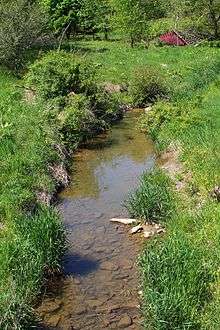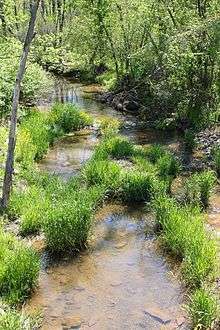Johnson Creek (Lithia Springs Creek)
| Johnson Creek | |
|---|---|
 Johnson Creek looking upstream | |
| Other name(s) | Johnson's Creek |
| Basin | |
| Main source |
valley on Montour Ridge in Point Township, Northumberland County, Pennsylvania 800 ft (240 m) |
| River mouth |
Lithia Springs Creek in Point Township, Northumberland County, Pennsylvania 486 ft (148 m) 40°55′27″N 76°45′56″W / 40.9242°N 76.7655°WCoordinates: 40°55′27″N 76°45′56″W / 40.9242°N 76.7655°W |
| Progression | Lithia Springs Creek → Susquehanna River → Chesapeake Bay |
| Basin size | 4.09 sq mi (10.6 km2) |
| Physical characteristics | |
| Length | 2.3 mi (3.7 km) |
Johnson Creek (also known as Johnson's Creek[1]) is a tributary of Lithia Springs Creek in Northumberland County, Pennsylvania, in the United States. It is approximately 2.3 miles (3.7 km) long and flows through Point Township.[2] The watershed of the creek has an area of 4.09 square miles (10.6 km2). It has no named tributaries, but has at least one unnamed tributary. A ridge known as Montour Ridge is in the watershed of the creek and a ravine with high levels of biodiversity is present on one if its tributaries. The creek is considered to be a Coldwater Fishery and a Migratory Fishery.
Course

Johnson Creek begins in a valley on Montour Ridge in Point Township. It flows south-southeast for several hundred feet and exits the valley. It then turns south for several tenths of a mile before turning south-southeast again for more than a mile. In this stretch, the creek receives two unnamed tributaries and enters another valley. It then receives two more unnamed tributaries and turns east and slightly north. After approximately a mile, it reaches its confluence with Lithia Springs Creek.[2]
Johnson Creek joins Lithia Springs Creek 1.64 miles (2.64 km) upstream of its mouth.[3]
Tributaries
Johnson Creek has no named tributaries.[2] However, it has a number of unnamed tributaries, including at least one that is fed by a spring.[2][4]
Geography
The elevation at the mouth of Johnson Creek is 486 feet (148 m) above sea level.[5] The elevation of the creek's source slightly under 800 feet (240 m) above sea level.[2]
A ridge known as Montour Ridge is in the vicinity of Johnson Creek. A tributary of the creek flows through a ravine known as the Montour Ridge Ravine, which is situated on the ridge.[4] The creek is the only stream in Northumberland or Point Township to have a 100 year floodplain.[1]
Water from the Lithia Spring Sewer Project discharges into Johnson Creek.[6] Expansion of sewage collection lines near the creek has been proposed in the __.[1]
Watershed
The watershed of Johnson Creek has an area of 4.09 square miles (10.6 km2).[3] The creek is in the United States Geological Survey quadrangle of Northumberland.[5] It is approximately 3 miles (4.8 km) northeast of the community of Northumberland.[7] The Montour Ridge Ravine, which a tributary of the creek flows through, is listed as a Locally Significant Area in the Northumberland County Natural Areas Inventory and is given a rank of "high" in the inventory. The ravine is on private land.[4]
History
Johnson Creek was entered into the Geographic Names Information System on August 2, 1979. Its identifier in the Geographic Names Information System is 1178111.[5]
Permission was requested of the supervisors of Point Township to construct a bridge over Johnson Creek in around 1917.[7]
Biology
Hemlocks line the Montour Ridge Ravine, which a tributary of Johnson Creek flows through. This area has a high level of plant and animal biodiversity. Plant species such as spicebush, Canada mayflower, wild sarsaparilla, skunk cabbage, jack-in-the-pulpit, red maple, striped maple, Allegheny blackberry, witch-hazel, basswood, beech, and violets. Various salamander species, such as Eurycea bislineata, Gyrinophilus porphyriticus, and Desmognathus fuscus fuscus also inhabit the area. The hemlock wooly adelgid has also been observed in the ravine.[4]
Johnson Creek is considered to be a Coldwater Fishery and a Migratory Fishery.[6]
See also
References
- 1 2 3 Northumberland Borough-Point Township Joint Comprehensive Plan And Joint Parks, Recreation and Open Space Plan July 2009 (PDF), July 2009, retrieved October 28, 2014
- 1 2 3 4 5 United States Geological Survey, The National Map Viewer, retrieved October 27, 2014
- 1 2 Pennsylvania Gazetteer of Streams (PDF), November 2, 2001, retrieved October 27, 2014
- 1 2 3 4 Western Pennsylvania Conservancy (2008), A NATURAL AREAS INVENTORY OF NORTHUMBERLAND COUNTY, PENNSYLVANIA Update 2008 (PDF), retrieved October 28, 2014
- 1 2 3 Geographic Names Information System, Feature Detail Report for: Johnson Creek, retrieved October 28, 2014
- 1 2 THE PENNSYLVANIA CLEAN STREAMS LAW AND THE FEDERAL CLEAN WATER ACT: FINAL ACTIONS TAKEN FOR NPDES PERMITS AND WQM PERMITS, Pennsylvania Bulletin, July 13, 2013, retrieved October 28, 2014
- 1 2 Department Reports of Pennsylvania, Volume 3, Part 3, 1917, p. 2141, retrieved October 28, 2014